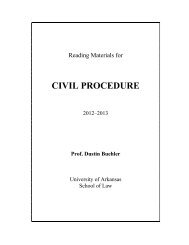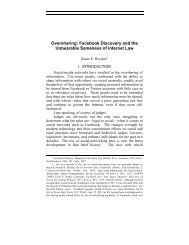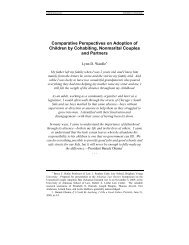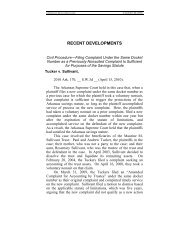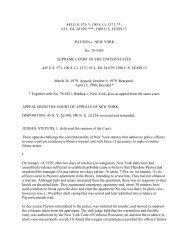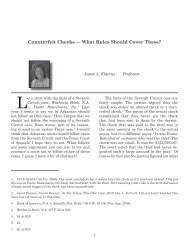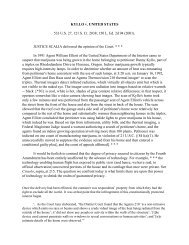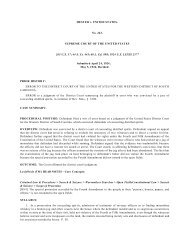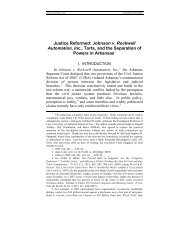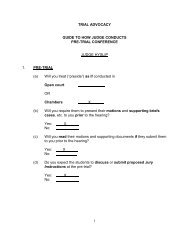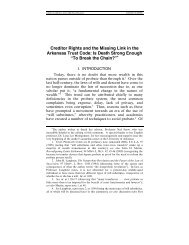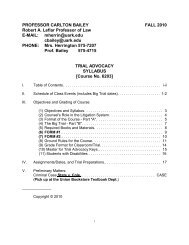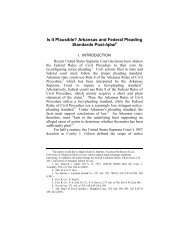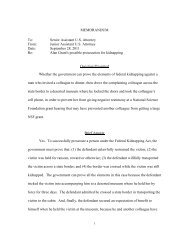Minors, You Are What You Drink!: Arkansas's New Spin on Minors in ...
Minors, You Are What You Drink!: Arkansas's New Spin on Minors in ...
Minors, You Are What You Drink!: Arkansas's New Spin on Minors in ...
You also want an ePaper? Increase the reach of your titles
YUMPU automatically turns print PDFs into web optimized ePapers that Google loves.
988 ARKANSAS LAW REVIEW [Vol. 65:977<br />
B. C<strong>on</strong>trolled Substances Cases<br />
In cases <strong>in</strong>volv<strong>in</strong>g c<strong>on</strong>trolled substances, most states<br />
adhere to the same reas<strong>on</strong><strong>in</strong>g articulated <strong>in</strong> Evans and<br />
Nethercutt and c<strong>on</strong>clude that <strong>on</strong>ce a c<strong>on</strong>trolled substance or<br />
any illegal drug is <strong>in</strong>gested, it is no l<strong>on</strong>ger said to be <strong>in</strong> <strong>on</strong>e’s<br />
possessi<strong>on</strong>. 74 The general c<strong>on</strong>sensus is that <strong>on</strong>e cannot<br />
c<strong>on</strong>t<strong>in</strong>ue to exert dom<strong>in</strong>i<strong>on</strong> or c<strong>on</strong>trol over someth<strong>in</strong>g that<br />
has been <strong>in</strong>gested. 75 Therefore, such evidence must be<br />
74. See, e.g., State v. Thr<strong>on</strong>sen, 809 P.2d 941, 943 (Alaska Ct. App. 1991)<br />
(hold<strong>in</strong>g that evidence of coca<strong>in</strong>e <strong>in</strong> the body does not amount to possessi<strong>on</strong> because<br />
a pers<strong>on</strong> no l<strong>on</strong>ger has c<strong>on</strong>trol over the substance); People v. Spann, 187 Cal. Rptr.<br />
31, 36 (Ct. App. 1986) (hold<strong>in</strong>g that “possessi<strong>on</strong> of a c<strong>on</strong>trolled substance may not<br />
be proven by its crim<strong>in</strong>al use”); Green v. State, 398 S.E.2d 360, 362 (Ga. 1990)<br />
(hold<strong>in</strong>g that “the presence of coca<strong>in</strong>e metabolites <strong>in</strong> body fluid is <strong>on</strong>ly<br />
circumstantial or <strong>in</strong>direct evidence,” i.e., “evidence which <strong>on</strong>ly tends to establish<br />
[that the pers<strong>on</strong> possessed coca<strong>in</strong>e] by proof of various facts, susta<strong>in</strong><strong>in</strong>g by their<br />
c<strong>on</strong>sistency the hypothesis claimed” (<strong>in</strong>ternal quotati<strong>on</strong>s omitted)); State v. Vorm,<br />
570 N.E.2d 109, 111 (Ind. Ct. App. 1991) (hold<strong>in</strong>g that the “mere presence of<br />
coca<strong>in</strong>e metabolites <strong>in</strong> a blood or ur<strong>in</strong>e sample, without additi<strong>on</strong>al evidence, does<br />
not c<strong>on</strong>stitute prima facie evidence of know<strong>in</strong>g and voluntary possessi<strong>on</strong> of<br />
coca<strong>in</strong>e”); State v. Ramirez, 100 P.3d 94, 98 (Kan. 2004) (hold<strong>in</strong>g that evidence of a<br />
drug <strong>in</strong> <strong>on</strong>e’s bloodstream does not amount to possessi<strong>on</strong> under Kansas law); State<br />
v. Fl<strong>in</strong>chpaugh, 659 P.2d 208, 212 (Kan. 1983) (hold<strong>in</strong>g that “[d]iscovery of a drug <strong>in</strong><br />
a pers<strong>on</strong>'s blood is circumstantial evidence tend<strong>in</strong>g to prove prior possessi<strong>on</strong> of the<br />
drug, but it is not sufficient evidence to establish guilt bey<strong>on</strong>d a reas<strong>on</strong>able doubt”);<br />
Frankl<strong>in</strong> v. State, 258 A.2d 767, 769 (Md. Ct. Spec. App. 1969) (hold<strong>in</strong>g that “<strong>on</strong>ce<br />
the drug is <strong>in</strong>gested and assimilated <strong>in</strong>to the taker's bodily system, it is no l<strong>on</strong>ger<br />
with<strong>in</strong> his c<strong>on</strong>trol and/or possessi<strong>on</strong>”); State v. Lewis, 394 N.W.2d 212, 217 (M<strong>in</strong>n.<br />
Ct. App. 1986) (hold<strong>in</strong>g that the “usual and ord<strong>in</strong>ary mean<strong>in</strong>g of the term<br />
‘possessi<strong>on</strong>’ does not <strong>in</strong>clude substances <strong>in</strong>jected <strong>in</strong>to the body and assimilated <strong>in</strong>to<br />
the system,” therefore, evidence of morph<strong>in</strong>e <strong>in</strong> the body, without more, does not<br />
amount to possessi<strong>on</strong>); In re R.L.H., 116 P.3d 791, 795-96 (M<strong>on</strong>t. 2005) (hold<strong>in</strong>g that<br />
evidence of a c<strong>on</strong>trolled substance <strong>in</strong> the body c<strong>on</strong>stitutes proof of possessi<strong>on</strong> “<strong>on</strong>ly<br />
when accompanied by other corroborat<strong>in</strong>g evidence of know<strong>in</strong>g and voluntary<br />
possessi<strong>on</strong>”); State v. Yanez, 553 P.2d 252, 252 (N.M. Ct. App. 1976) (hold<strong>in</strong>g that<br />
the presence of morph<strong>in</strong>e is <strong>on</strong>ly circumstantial evidence tend<strong>in</strong>g to show possessi<strong>on</strong><br />
and must be coupled with additi<strong>on</strong>al facts before amount<strong>in</strong>g to a possessi<strong>on</strong><br />
offense); State v. Harris, 632 S.E.2d 534, 537 (N.C. Ct. App. 2006) (hold<strong>in</strong>g that “a<br />
positive ur<strong>in</strong>e test, without more, does not satisfy the <strong>in</strong>tent or the knowledge<br />
requirement <strong>in</strong>herent <strong>in</strong> our statutory def<strong>in</strong>iti<strong>on</strong> of possessi<strong>on</strong>”); State v. Dal<strong>in</strong>e, 30<br />
P.3d 426, 430 (Or. Ct. App. 2001) (hold<strong>in</strong>g that “c<strong>on</strong>sumpti<strong>on</strong> of a c<strong>on</strong>trolled<br />
substance does not c<strong>on</strong>stitute possessi<strong>on</strong> of a c<strong>on</strong>trolled substance because <strong>on</strong>ce it is<br />
<strong>in</strong> the bloodstream a pers<strong>on</strong> can no l<strong>on</strong>ger exercise dom<strong>in</strong>i<strong>on</strong> or c<strong>on</strong>trol over it”);<br />
State v. Griff<strong>in</strong>, 584 N.W.2d 127, 136 (Wis. Ct. App. 1998) (hold<strong>in</strong>g that a positive<br />
ur<strong>in</strong>alysis test for coca<strong>in</strong>e does not c<strong>on</strong>stitute possessi<strong>on</strong> of the substance).<br />
75. See, e.g., Frankl<strong>in</strong>, 258 A.2d at 769.



